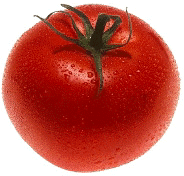...Best of Sicily presents... Best of Sicily Magazine. ... Dedicated to Sicilian art, culture, history, people, places and all things Sicilian. |
by Roberta Gangi | |||
Magazine Index Best of Sicily Arts & Culture Fashion Food & Wine History & Society About Us Travel Faqs Contact Map of Sicily |
Virtually unknown until about ten years ago, lycopene counteracts the effects of saturated fats such as the cholesterol in red meat. These fats constrict arteries, and over the long term can act to block them. The lycopene in tomatoes, however, dilates the arteries. Heated tomatoes more effectively release lycopene than raw ones. When consumed with fat, the lycopene is actually absorbed more effectively. This is especially beneficial if one consumes a healthy fat like the monounsaturated kind present in extra virgin olive oil. Many pasta sauces are based on these two ingredients, and tomato sauce is part of the Italian version of the Mediterranean Diet. The recently-published (and unpleasant) statistic that the teenagers of Palermo are among Italy's most obese reflects the fact that the Mediterranean Diet rarely exists in its purest form in Sicily today, but it's nice to remember what it was. Culinary historians will be quick to point out that tomatoes are not really Mediterranean; they were "discovered" in warm American regions by the Spanish and Italian explorers who began to arrive there late in the fifteenth century. According to recent historical research, and despite the
The introduction of tomatoes and other fruits and vegetables signalled a change in the European diet. In some cases, though less so in Sicily's, entire agricultural systems evolved in a radically new direction, and it was generally a healthier one. Potatoes, for example, contain Vitamin C (ascorbic acid), which until this tuber's introduction into Europe was obtained primarily from things like cabbage, but in Sicily citrus fruits and broccoli were the main sources of this nutrient. Almost everything brought from the Americas would grow in Sicily, and crops such as potatoes were even adept to cultivation in cooler regions, from Russia to Ireland. While tomatoes may not be indigenous to the Mediterranean, they have been here for the better part of five centuries. Like chocolate. It should be remembered that the Spanish explorers were initially seeking a route to the Indies for what were principally culinary --and commercial-- objectives. The spices they found were not precisely what they were looking for, but close enough; various forms of pepper are now used in cuisines everywhere. That the Spaniards reached entire inhabited continents, encountering sophisticated civilisations and unimagined wealth in the process, brought about the beginning of the shift in their attention away from Europe and the Mediterranean and toward the so-called New World. (The fact that the Norsemen, predecessors of the Normans, had already landed in what is now Canada was generally unknown in 1492, and in the event theirs was not a permanent presence.) By definition, lycopene (C40H56) is a bright red carotenoid pigment and phytochemical found in gac (native to southeast Asia), tomatoes, red carrots, red peppers, goji, watermelons, rose hip and papayas, but generally not in berries and cherries. Evidence is insufficient to conclude that there is a causal relationship between lycopene consumption and a reduced risk of prostate cancer. However, lycopene, and most of the fruits which contain it (tomatoes are sometimes classified as a "fruit") have antioxidant properties. That isn't a bad thing. About the Author: Roberta Gangi has written numerous articles and one book dealing with Italian cultural and culinary history, and a number of food and wine articles for Best of Sicily Magazine. | ||
Top of Page |
 Lycopene
is a substance found in red tomatoes, especially cooked ones,
and it's best when consumed with olive oil. Here's the theory.
Lycopene
is a substance found in red tomatoes, especially cooked ones,
and it's best when consumed with olive oil. Here's the theory.